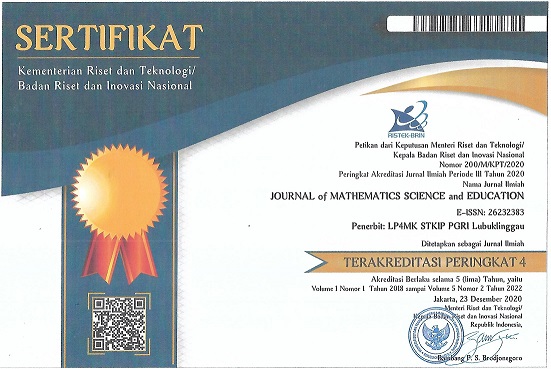MATHEMATICS ANXIETY AND SELF EFFICACY IN DOING MATHEMATICAL PROOF
Abstract
Self-Efficacy or a lack of confidence is one of the causes of mathematical anxiety. This paper discusses the best way to overcome mathematical anxiety, self efficacy in proving mathematics. The method used is literature review. Self efficacy has an important role in eliminating the anxiety of mathematics, where if someone has confidence in their abilities, they will be more happy and active in proving mathematics. But sometimes most do not believe or believe in themselves so they tend to be lazy in doing mathematical proof, therefore a learning community is needed where they are able to interact and exchange ideas so that they can open up opportunities to be able to prove mathematics without the math anxiety.
References
Epp, S. (2003). The role of logic in teaching proof. The American Mathematics Monthly, 110(10), 886-899.
Gowers, W.T. The Language and Grammar in Mathematics. Diunduh dari https://www.dpmms.cam.ac.uk/~wtg10/grammar.pdf tanggal 16 juni 2017.
Jamison, R.E. (2000). Learning and Language in Mathematics in Language and Learning Across the Disciplines. Diunduh dari wac.coloasate.edu. tanggal 16 juni 2017.
Johnson, D. (2003). Math Anxiety. Literature Review. Knuth, E. (2002). Secondary school mathematics teachers’ conception of proof. Dalam Journal for Research in Mathematics Education, 33(5), 379-405.
Khatoon, T. & Mahmood, S. (2010). Mathematics Anxiety Among Secondary School Students in India and its Relationship to Achievement in Mathematics. European Journal of Social Science, 16 (1), 75-86.
Lestari, E.K, Ridwan, M. (2015). Penelitian Pendidikan Matematika. Bandung:PT Refika Aditama.
Lunenburg, F.C. (2011). Self efficacy in the workplace: implication for motivation and performance. International Journal of Management, Bussiness, and Administration, vol 14, no 1
Ma, X. (2003). Effect of Early Acceleration of Students in Mathematics on Attitude toward Mathematics and Mathematics Anxiety. Teachers College Record, 105 (3), 438-464.
Martin, W. G,, & Harel, G. (1989). Proof frames of preservice elementary teachers. Journal for Research in Mathematics Education, 20(1), 41 – 51.
Moore, R.C., (1994). Making Transition to Formal Proof. Journal of Educational Studies in Mathematics 27: 249-266. Kluwer Academic Publisher: Netherlands.
Nawangsari, N. A. F. (2001). Pengaruh self-efficacy dan expectancy-value terhadap kecemasan menghadapi pelajaran matematika. Jurnal Psikologi Pendidikan: Insan media psikologi, 3,2, 2001, 75
Peker, M. (2009). “Pre-Service Teachers’ Teaching Anxiety about Mathematics and Their Learning Styles”. Eurasia Journal of Mathematics, Science, & Technology Eductaion. 5 (4), 335-345.
Remillard, K.S. (2010). Exploring the learning of mathematicak proof by undergraduate mathematics majors through discourse analysis. Proceedings of the 13th Annual Conference in Researh in Undergraduate Mathematics Education.
Santosa, C. (2013). mengatasi kesulitan mahasiswa ketika melakukan pembuktian matematis formal. Jurnal Pengajaran MIPA, Volume 18, Nomor 2, Oktober 2013, hlm. 152-160.
Van Dormolen, J. (1977). Learning to understand what giving a proof really means. Educational Studies in Mathematics, 8, 27-34.
Vanspronsen, H.D. (2008). Proof Processes Of Novice Mathematics Proof Writers. Dissertation University of Montana, Missoula.
Wahyudin. (2010). Monograf: Kecemasan Matematika. Bandung: Program Studi Pendidikan Matematika SPS UPI.
Yanti, D., Fauziah, A., & Friansah, D. (2017). Pengaruh model pembelajaran kontekstual terhadap kemampuan koneksi matematika siswa kelas X SMA Negeri 4 Lubuklinggau Tahun Pelajaran 2015/2016. Jurnal Pendidikan Matematika Raflesia, 2(2).
Zakaria, E., Nordin, N. M. (2008). “The Effects of Mathematics Anxiety on Matriculation Student as Related to Motivation and Achievement”. Eurasia Journal of Mathematics, Science, & Technology Eductaion. 4 (1), 27-30.
Zandieh, M. & Sean, L. (2008). Proofs and refutations in the undergraduate mathematics classroom. Educational Studies in Mathematics, Vol. 67, No. 3.

This work is licensed under a Creative Commons Attribution-NonCommercial-ShareAlike 4.0 International License.

This work by Journal of Mathematics Science and Education is licensed under a Creative Commons Attribution-NonCommercial-ShareAlike 4.0 International License.

















